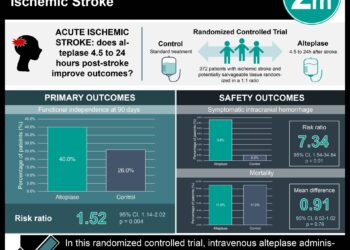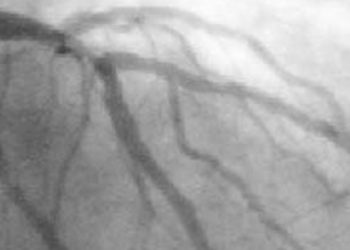Screening for asymptomatic atrial fibrillation does not reduce risk of stroke despite higher detection rates
1. There was a nonsignificant reduction (p=0.11) in the incidence of stroke or systemic arterial embolism in the ILR group (4.5%) than control (5.6%).
2. Prophylactic anticoagulant use did not significantly reduce the likelihood of subsequent progression to stroke or systemic arterial embolism.
Evidence Rating Level: 1 (Excellent)
Study Rundown: There is strong association between atrial fibrillation and ischemic stroke. However, little evidence exists surrounding stroke prevention in patients screened for asymptomatic atrial fibrillation and subsequently treated with prophylaxis anticoagulation. This randomized controlled trial aimed to determine whether using prophylactic anticoagulation in high-risk patients with a positive screen for atrial fibrillation can prevent progression to stroke. An implantable loop recorder (ILR) was used to detect asymptomatic atrial fibrillation in patients randomized to the treatment arm. The primary outcome for this study was the time to first presentation of stroke or systemic arterial embolism, while key secondary outcomes included a composite of ischemic stroke, transient ischemic attack, or systemic arterial embolism, and all-cause mortality. According to the results, there was a 3-fold increase in the detection of atrial fibrillation in the ILR group compared to the control group. However, this did not translate into a significant difference in the primary outcome of stroke or systemic arterial embolism. In addition, major bleeding episodes were numerically higher in the ILR group than control. This study was strengthened by a longitudinal follow-up and a large sample size, increasing the validity of findings.
Click to read the study in The Lancet
In-depth [randomized controlled trial]: Between Jan 31, 2014, and May 17, 2016, 6205 patients were assessed for eligibility across four centers in Denmark. Included were those between 70-90 years old with a history of hypertension, diabetes, previous stroke, or heart failure, no known diagnosis of atrial fibrillation and no contraindications to anticoagulation. Altogether, 6004 patients (1501 in ILR and 4503 in control) were included in the analysis. Patients in the ILR group were treated with oral anticoagulation if an atrial fibrillation episode lasting more than 6 minutes had occurred. The control group underwent usual care which included an annual interview and regular visits to their general practitioner. The mean patient age was 74.7 years (standard deviation [SD] 4.1) and the median follow-up time was 64.5 months (interquartile range [IQR] 59.3-69.8). The incidence of atrial fibrillation was approximately 3-times higher in the ILR group (31.8%) than the control (12.2%; Hazard Ratio = 3.17 [95% CI 2.81-3.59], p<0.0001). However, the primary outcome of stroke or systemic arterial embolism did not differ significantly between the ILR group (4.5%) and control (5.6%, hazard ratio [HR] 0.80, 95% confidence interval [CI] 0.61-1.05, p=0.11). In addition, major bleeding was slightly more common in the ILR group (4.3% vs. 3.5%, HR 1.26, 95% CI 0.95-1.69, p=0.11). Overall, findings from this study suggest that prophylactic anticoagulant use did not significantly reduce the risk of stroke or systemic arterial embolism among patients screened for asymptomatic atrial fibrillation.
Image: PD
©2021 2 Minute Medicine, Inc. All rights reserved. No works may be reproduced without expressed written consent from 2 Minute Medicine, Inc. Inquire about licensing here. No article should be construed as medical advice and is not intended as such by the authors or by 2 Minute Medicine, Inc.








